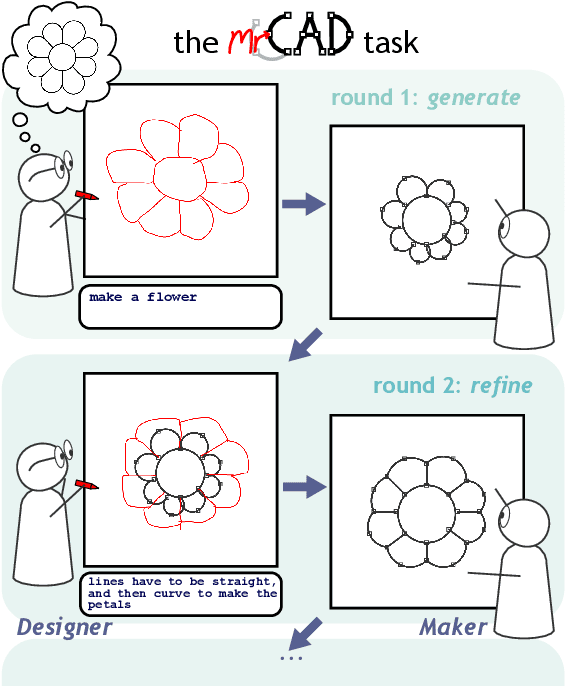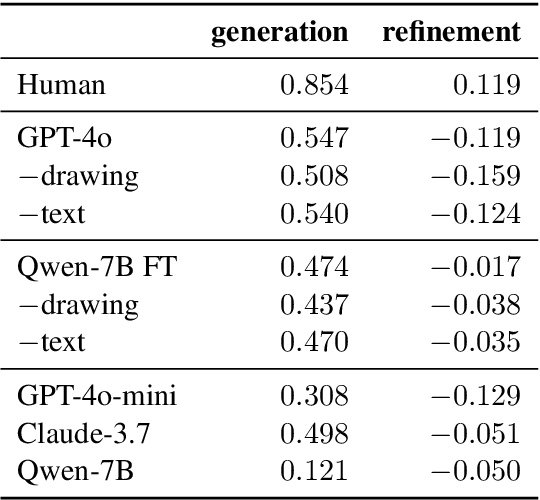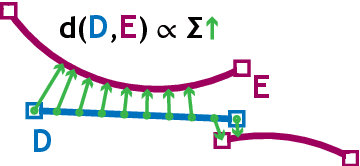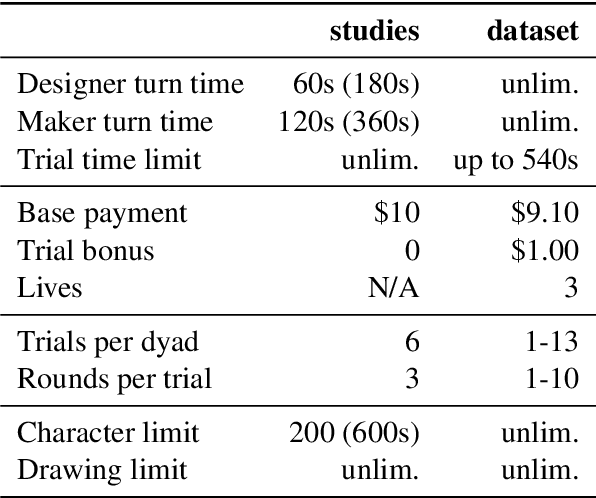Daniel Fried
Reasoning with Latent Tokens in Diffusion Language Models
Feb 03, 2026Abstract:Discrete diffusion models have recently become competitive with autoregressive models for language modeling, even outperforming them on reasoning tasks requiring planning and global coherence, but they require more computation at inference time. We trace this trade-off to a key mechanism: diffusion models are trained to jointly predict a distribution over all unknown tokens, including those that will not actually be decoded in the current step. Ablating this joint prediction yields faster inference but degrades performance, revealing that accurate prediction at the decoded position relies on joint reasoning about the distribution of undecoded tokens. We interpret these as latent tokens and introduce a method for modulating their number, demonstrating empirically that this enables a smooth tradeoff between inference speed and sample quality. Furthermore, we demonstrate that latent tokens can be introduced into autoregressive models through an auxiliary multi-token prediction objective, yielding substantial improvements on the same reasoning tasks where they have traditionally struggled. Our results suggest that latent tokens, while arising naturally in diffusion, represent a general mechanism for improving performance on tasks requiring global coherence or lookahead.
The Llama 4 Herd: Architecture, Training, Evaluation, and Deployment Notes
Jan 15, 2026Abstract:This document consolidates publicly reported technical details about Metas Llama 4 model family. It summarizes (i) released variants (Scout and Maverick) and the broader herd context including the previewed Behemoth teacher model, (ii) architectural characteristics beyond a high-level MoE description covering routed/shared-expert structure, early-fusion multimodality, and long-context design elements reported for Scout (iRoPE and length generalization strategies), (iii) training disclosures spanning pre-training, mid-training for long-context extension, and post-training methodology (lightweight SFT, online RL, and lightweight DPO) as described in release materials, (iv) developer-reported benchmark results for both base and instruction-tuned checkpoints, and (v) practical deployment constraints observed across major serving environments, including provider-specific context limits and quantization packaging. The manuscript also summarizes licensing obligations relevant to redistribution and derivative naming, and reviews publicly described safeguards and evaluation practices. The goal is to provide a compact technical reference for researchers and practitioners who need precise, source-backed facts about Llama 4.
Toward Training Superintelligent Software Agents through Self-Play SWE-RL
Dec 21, 2025Abstract:While current software agents powered by large language models (LLMs) and agentic reinforcement learning (RL) can boost programmer productivity, their training data (e.g., GitHub issues and pull requests) and environments (e.g., pass-to-pass and fail-to-pass tests) heavily depend on human knowledge or curation, posing a fundamental barrier to superintelligence. In this paper, we present Self-play SWE-RL (SSR), a first step toward training paradigms for superintelligent software agents. Our approach takes minimal data assumptions, only requiring access to sandboxed repositories with source code and installed dependencies, with no need for human-labeled issues or tests. Grounded in these real-world codebases, a single LLM agent is trained via reinforcement learning in a self-play setting to iteratively inject and repair software bugs of increasing complexity, with each bug formally specified by a test patch rather than a natural language issue description. On the SWE-bench Verified and SWE-Bench Pro benchmarks, SSR achieves notable self-improvement (+10.4 and +7.8 points, respectively) and consistently outperforms the human-data baseline over the entire training trajectory, despite being evaluated on natural language issues absent from self-play. Our results, albeit early, suggest a path where agents autonomously gather extensive learning experiences from real-world software repositories, ultimately enabling superintelligent systems that exceed human capabilities in understanding how systems are constructed, solving novel challenges, and autonomously creating new software from scratch.
Measuring Fine-Grained Negotiation Tactics of Humans and LLMs in Diplomacy
Dec 20, 2025Abstract:The study of negotiation styles dates back to Aristotle's ethos-pathos-logos rhetoric. Prior efforts primarily studied the success of negotiation agents. Here, we shift the focus towards the styles of negotiation strategies. Our focus is the strategic dialogue board game Diplomacy, which affords rich natural language negotiation and measures of game success. We used LLM-as-a-judge to annotate a large human-human set of Diplomacy games for fine-grained negotiation tactics from a sociologically-grounded taxonomy. Using a combination of the It Takes Two and WebDiplomacy datasets, we demonstrate the reliability of our LLM-as-a-Judge framework and show strong correlations between negotiation features and success in the Diplomacy setting. Lastly, we investigate the differences between LLM and human negotiation strategies and show that fine-tuning can steer LLM agents toward more human-like negotiation behaviors.
Propose, Solve, Verify: Self-Play Through Formal Verification
Dec 20, 2025



Abstract:Training models through self-play alone (without any human data) has been a longstanding goal in AI, but its effectiveness for training large language models remains unclear, particularly in code generation where rewards based on unit tests are brittle and prone to error propagation. We study self-play in the verified code generation setting, where formal verification provides reliable correctness signals. We introduce Propose, Solve, Verify (PSV) a simple self-play framework where formal verification signals are used to create a proposer capable of generating challenging synthetic problems and a solver trained via expert iteration. We use PSV to train PSV-Verus, which across three benchmarks improves pass@1 by up to 9.6x over inference-only and expert-iteration baselines. We show that performance scales with the number of generated questions and training iterations, and through ablations identify formal verification and difficulty-aware proposal as essential ingredients for successful self-play.
How Do AI Agents Do Human Work? Comparing AI and Human Workflows Across Diverse Occupations
Oct 26, 2025Abstract:AI agents are continually optimized for tasks related to human work, such as software engineering and professional writing, signaling a pressing trend with significant impacts on the human workforce. However, these agent developments have often not been grounded in a clear understanding of how humans execute work, to reveal what expertise agents possess and the roles they can play in diverse workflows. In this work, we study how agents do human work by presenting the first direct comparison of human and agent workers across multiple essential work-related skills: data analysis, engineering, computation, writing, and design. To better understand and compare heterogeneous computer-use activities of workers, we introduce a scalable toolkit to induce interpretable, structured workflows from either human or agent computer-use activities. Using such induced workflows, we compare how humans and agents perform the same tasks and find that: (1) While agents exhibit promise in their alignment to human workflows, they take an overwhelmingly programmatic approach across all work domains, even for open-ended, visually dependent tasks like design, creating a contrast with the UI-centric methods typically used by humans. (2) Agents produce work of inferior quality, yet often mask their deficiencies via data fabrication and misuse of advanced tools. (3) Nonetheless, agents deliver results 88.3% faster and cost 90.4-96.2% less than humans, highlighting the potential for enabling efficient collaboration by delegating easily programmable tasks to agents.
Identifying & Interactively Refining Ambiguous User Goals for Data Visualization Code Generation
Oct 10, 2025Abstract:Establishing shared goals is a fundamental step in human-AI communication. However, ambiguities can lead to outputs that seem correct but fail to reflect the speaker's intent. In this paper, we explore this issue with a focus on the data visualization domain, where ambiguities in natural language impact the generation of code that visualizes data. The availability of multiple views on the contextual (e.g., the intended plot and the code rendering the plot) allows for a unique and comprehensive analysis of diverse ambiguity types. We develop a taxonomy of types of ambiguity that arise in this task and propose metrics to quantify them. Using Matplotlib problems from the DS-1000 dataset, we demonstrate that our ambiguity metrics better correlate with human annotations than uncertainty baselines. Our work also explores how multi-turn dialogue can reduce ambiguity, therefore, improve code accuracy by better matching user goals. We evaluate three pragmatic models to inform our dialogue strategies: Gricean Cooperativity, Discourse Representation Theory, and Questions under Discussion. A simulated user study reveals how pragmatic dialogues reduce ambiguity and enhance code accuracy, highlighting the value of multi-turn exchanges in code generation.
MetaLint: Generalizable Idiomatic Code Quality Analysis through Instruction-Following and Easy-to-Hard Generalization
Jul 15, 2025



Abstract:Large Language Models, though successful in code generation, struggle with code quality analysis because they are limited by static training data and can't easily adapt to evolving best practices. We introduce MetaLint, a new instruction-following framework that formulates code quality analysis as the task of detecting and fixing problematic semantic code fragments or code idioms based on high-level specifications. Unlike conventional approaches that train models on static, rule-based data, MetaLint employs instruction tuning on synthetic linter-generated data to support easy-to-hard generalization, enabling models to adapt to novel or complex code patterns without retraining. To evaluate this, we construct a benchmark of challenging idioms inspired by real-world coding standards such as Python Enhancement Proposals (PEPs) and assess whether MetaLint-trained models reason adaptively or simply memorize. Our results show that MetaLint improves generalization to unseen PEP idioms, achieving a 70.37% F-score on idiom detection with the highest recall (70.43%) among all evaluated models. It also achieves 26.73% on localization, competitive for its 4B parameter size and comparable to larger state-of-the-art models like o3-mini, highlighting its potential for future-proof code quality analysis.
From Reproduction to Replication: Evaluating Research Agents with Progressive Code Masking
Jun 24, 2025Abstract:Recent progress in autonomous code generation has fueled excitement around AI agents capable of accelerating scientific discovery by running experiments. However, there is currently no benchmark that evaluates whether such agents can implement scientific ideas when given varied amounts of code as a starting point, interpolating between reproduction (running code) and from-scratch replication (fully re-implementing and running code). We introduce AutoExperiment, a benchmark that evaluates AI agents' ability to implement and run machine learning experiments based on natural language descriptions in research papers. In each task, agents are given a research paper, a codebase with key functions masked out, and a command to run the experiment. The goal is to generate the missing code, execute the experiment in a sandboxed environment, and reproduce the results. AutoExperiment scales in difficulty by varying the number of missing functions $n$, ranging from partial reproduction to full replication. We evaluate state-of-the-art agents and find that performance degrades rapidly as $n$ increases. Agents that can dynamically interact with the environment (e.g. to debug their code) can outperform agents in fixed "agentless" harnesses, and there exists a significant gap between single-shot and multi-trial success rates (Pass@1 vs. Pass@5), motivating verifier approaches to our benchmark. Our findings highlight critical challenges in long-horizon code generation, context retrieval, and autonomous experiment execution, establishing AutoExperiment as a new benchmark for evaluating progress in AI-driven scientific experimentation. Our data and code are open-sourced at https://github.com/j1mk1m/AutoExperiment .
mrCAD: Multimodal Refinement of Computer-aided Designs
Apr 28, 2025



Abstract:A key feature of human collaboration is the ability to iteratively refine the concepts we have communicated. In contrast, while generative AI excels at the \textit{generation} of content, it often struggles to make specific language-guided \textit{modifications} of its prior outputs. To bridge the gap between how humans and machines perform edits, we present mrCAD, a dataset of multimodal instructions in a communication game. In each game, players created computer aided designs (CADs) and refined them over several rounds to match specific target designs. Only one player, the Designer, could see the target, and they must instruct the other player, the Maker, using text, drawing, or a combination of modalities. mrCAD consists of 6,082 communication games, 15,163 instruction-execution rounds, played between 1,092 pairs of human players. We analyze the dataset and find that generation and refinement instructions differ in their composition of drawing and text. Using the mrCAD task as a benchmark, we find that state-of-the-art VLMs are better at following generation instructions than refinement instructions. These results lay a foundation for analyzing and modeling a multimodal language of refinement that is not represented in previous datasets.
 Add to Chrome
Add to Chrome Add to Firefox
Add to Firefox Add to Edge
Add to Edge